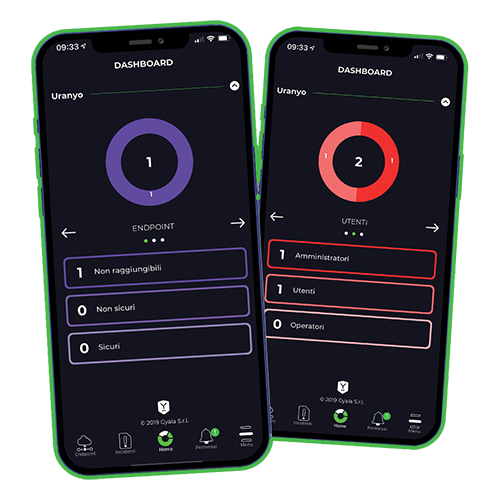Information on the processing of personal data. Information document pursuant to and for the purposes of articles 13 and 14 of EU Regulation no. 679/2016 ("GDPR")
1. Definitions
Cookies
are short text files (letters and/or numbers)
that allow the web server to store information
on the client (through the user's Internet
browser) to be reused during a visit to the
website (session cookies) or later, even days
later (persistent cookies). Cookies are stored,
based on user preferences, by the single browser
on the specific device used (computer, tablet,
smartphone).
Cookies, usually present in
users' browsers in very large numbers and
sometimes even with characteristics of large
temporal persistence, are used for different
purposes: execution of IT authentications,
monitoring of sessions, memorization of
information on specific configurations
concerning users who access the servers,
etc.
Cookies do not record the user's
personal information and any identifiable data
is not stored. If you want to disable the use of
cookies, you need to customize your browser
settings. You can set the deletion of cookies or
activate a warning when cookies are saved on
your computer. To proceed without changing the
cookie storage rules, simply continue
browsing.
To find out more about cookies and
how they work, visit the website www.allaboutcookies.org or www.youronlinechoices.eu.
2. Types of cookies
In
implementation of the provisions contained in
Directive 2009/136/EC, the legislator has
brought back the obligation to acquire the prior
and informed consent of users for the
installation of cookies used for purposes other
than purely technical ones (cf. art. 1,
paragraph 5, letter a), of Legislative Decree 28
May 2012, n. 69, which amended the art. 122 of
the Privacy Code).
In this regard, and for
the purposes of this provision, two
macro-categories are therefore identified:
technical cookies and profiling cookies.
a. Technical
cookies.
Technical cookies
are those used for the sole purpose of carrying
out the transmission of a communication over an
electronic communications network, or as
strictly necessary for the provider of an
information society service explicitly requested
by the subscriber or user to provide such
service (cf. art. 122, paragraph 1, of the
Code).
They are not used for other purposes
and are normally installed directly by the owner
or manager of the website. They can be divided
into navigation or session cookies, which
guarantee normal navigation and use of the
website (allowing, for example, to make a
purchase or authenticate to access restricted
areas); analytics cookies, assimilated to
technical cookies when used directly by the site
manager to collect information, in aggregate
form, on the number of users and how they visit
the site; functionality cookies, which allow the
user to navigate according to a series of
selected criteria (for example, the language,
the products selected for purchase) in order to
improve the service rendered to the same.
For
the installation of these cookies, the prior
consent of the users is not required, while the
obligation to provide the information pursuant
to art. 13 of the Code, which the site manager,
if he uses only such devices, will be able to
provide in the manner he deems most suitable.
b. Profiling
cookies.
Profiling cookies
are designed to create user profiles and are
used to send advertising messages in line with
the preferences expressed by the user while
surfing the net. Due to the particular
invasiveness that such devices can have in the
private sphere of users, European and Italian
legislation provides that the user must be
adequately informed about their use and thus
express their valid consent.
The art refers
to them. 122 of the Code where it provides that
the filing of information in the terminal
equipment of a contractor or a user or access to
information already archived are permitted only
on condition that the contractor or user has
given his consent after being informed with the
simplified procedures referred to in article 13,
paragraph 3 (art. 122, paragraph 1, of the
Code).
3. Subjects involved: publishers and
third parties.
A further
element to consider, for the purpose of
correctly defining the subject in question, is
the subjective one. In other words, it is
necessary to take into account the different
entity that installs cookies on the user's
terminal, depending on whether it is the manager
of the site that the user is visiting (which can
be briefly referred to as publisher) or a
different site that install cookies through the
first (so-called third parties).
Visiting a
website you can receive cookies both from the
site visited (first party), and from so-called
third-party sites such as social plugins such as
Facebook, Twitter, Google+ and LinkedIn that
allow sharing of online content. The use of
third-party plugins involves the transmission of
cookies to and from all sites managed
externally. The management of information of
this type is governed by the information hosted
by the site of each third party to which
reference should be made.
This site uses both
temporary and persistent third-party technical
cookies (in addition to those mentioned above),
including:
Google Analytics (Google
Inc.)
This website uses
Google Analytics, a web analytics service
provided by Google. This service uses cookies to
allow the website to analyze how users navigate
through their pages. The information generated
by the cookies will be transmitted to Google
which will use it to examine the use of the
website in aggregate and anonymous form. Google
may in turn transmit this information to third
parties where required. The personal data
collected refer to cookies and usage data and
the place of processing is the USA – Click here for the
Privacy Policy.
Google Maps widget (Google
Inc.)
Google Maps is a map
visualization service managed by Google Inc.
which allows this application to integrate such
contents within its pages. The personal data
collected refer to cookies and usage data and
the place of processing is the USA – Click here for the
Privacy Policy.
Youtube Video Widgets (Google
Inc.)
Youtube is a video
content visualization service managed by Google
Inc. which allows this Application to integrate
such contents within its pages. The personal
data collected refer to cookies and usage data
and the place of processing is the USA – Click here for the
Privacy Policy.
Flash Cookies
Flash
cookies can be saved on your computer by sites
that use Adobe Flash. The technological design
is similar to that of cookies. Almost all
browsers use a Flash player which is used to
display presentations of this type (settings,
volume, etc). An example is the video player of
the YouTube site. There is no time limit for
Flash cookies. They therefore remain archived
until you proceed to delete them.
4. Management of
cookies.
The user is free to
decide whether or not to accept cookies through
the settings of his Internet browser. In fact,
cookies can be limited or blocked through the
browser settings. Disabling (partial or total)
of technical cookies can compromise the use of
the features of the site with a reserved area.
The usability of public content is also possible
by completely disabling cookies. Disabling
third-party cookies does not generally affect
the navigability of the site.
The setting can
be managed independently by the user in a
specific and detailed way by accessing the
settings of his browser, privacy section.
4.1 How to install or remove cookies from
your terminal
You can decide
which cookies to accept through the settings of
the browser you use to navigate. The default
settings of most browsers provide for the
acceptance of cookies, but the user can change
these settings by intervening on the
configuration of the browser itself. There are
also various types of software that can act on
cookies, such as web services or browser
add-ons.
The Help of the browser used to
navigate contains all the information to enable
or block cookies.
The procedure for managing
cookies may vary from one browser to another.
For more information: https://www.allaboutcookies.org/manage-cookies/
To disable cookies on a mobile phone (smartphone), please consult the relevant manual for more information.
4.2 Effects of disabling
cookies
If you decide to
disable cookies, it is advisable to take their
characteristics into account, to avoid incurring
unwanted changes to navigation on the site. In
particular, the deactivation of technical
cookies could prevent the use of some features
of the site.










